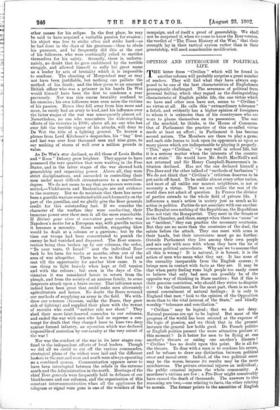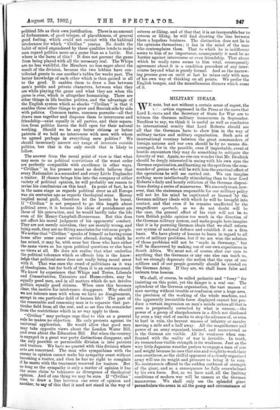OPINION AND INTERCOURSE IN POLITICAL LIFE. T HE letter from "
Civilian " which will be found in another column will probably surprise a great number of readers. They will find what they have always sup- posed to be one of the best characteristics of Englishmen peremptorily challenged. The severance of political from personal feeling, which they regard as the distinguishing characteristic of English public life, the one virtue which we have and other men have not, seems to " Civilian " no virtue at all. He calls this " extraordinary tolerance " a fetish, and evidently has a higher opinion of foreigners to whom it is unknown than of his countrymen who are wont to plume themselves on its possession. The seat of the mischief, he thinks, is the House of Commons. Out of Parliament the practice of this so-called virtue needs at least an effort ; in Parliament it has become second nature. The Members are there to play a game, and each side learns to look upon its opponents as upon so many pieces which are indispensable to playing it properly. " This, ' says " Civilian," " is very well in school life, but it is a serious matter when the interests of the country are at stake." He would have Mr. Swift MacNeill's nod not returned and Sir Henry Campbell-Bannerman's in- vitation declined. Has not the one declared himself a Pro-Boer and the other talked of "methods of barbarism"? We do not think that " Civilian's " criticism deserves to be put aside off-hand. To be unlike almost every other nation, and most of all unlike our nearest neighbours, is not of necessity a virtue. That we are unlike the rest of the world does not admit of question. In France the division of parties extends to the whole field of private life. 1 influences a man's action in society just as much as hit action in politics. Parties do not associate with one another. The Royalist sees nothing of the Republican, the Republican does not visit the Bonapartist. They meet in the Senate or in the Chamber, and there, except when there is a "scene" or an " incident," they can practise the necessary courtesies. But they are no more than the courtesies of the duel, the salute before the attack. They can meet with arms in their hands, but their intercourse must go no further. Outside Parliament they live among their own people and mix only with men with whom they have the tie of common political antecedents. Why are we to assume that all this is wrong ? It is natural, it is honest, it is the action of men who mean what they say. It has none of the unreality inseparable from the English system ; it brings men in contact with facts as they are. It may be that when party feeling runs high people too easily come to believe that only bad men can possibly be of the opposite way of thinking in State matters ; but if this is their genuine conviction, why should they strive to disguise it ? On the Continent, for the most part, there is no such unreal concealment of natural feelings ; it is only in England that men " look to the opinion of the Opposition more than to the vital interest of the State," and blindly worship " tolerance and conciliation."
" Civilian " may be logical ; that we do not deny. Natural.passions are apt to be logical. But most of the progress of the world has been secured at the expense of the logic of passion, and we think that in the present instance the general law holds good. Do French politics or English politics present the more attractive picture at this moment ? Is it better for men to be flying at one another's throats or eating one another's dinners ? " Civilian " has no doubt upon this point. He is all for the throats. To dine with a man is to condone his errors, and he refuses to draw any distinction between political error and moral error. Indeed, of the two political error may be the worse, because its results may be the more mischievous. The private criminal injures an individual ; the public criminal injures the whole community. A murderer's victims are few ; a Pro-Boer might conceivably have caused the death of thousands. The answers to this reasoning are two,—one relating to facts, the other relating to morals. The former points to the amenities of English political life as their own justification. There is an amount of forbearance, of good temper, of placableness, of general good feeling, which could not coexist with the habitual intolerance for which " CiYilian," yearns. No doubt the habit of mind engendered by these qualities tends to make men regard politics more as a game than as a battle. But where is the harm of this ? It does not prevent the game from being played with all the necessary zeal. The Whips are no less watchful, the Members no less eager about the result of the division, because the two lobbies have con- tributed guests to one another's tables for weeks past. The better knowledge of each other which is thus gained is all to the good. It enables them to draw a line between men's public and private characters, between what they are while playing the game and what they are when the game is over, which is altogether humanising. There are other things in life besides politics, and the advantage of the English system which so shocks " Civilian " is that it enables these other things to grow and flourish side by side with politics. Common tastes, common pursuits—all that draws men together and disposes them to intercourse and friendship—exist equally in all parties, and their separa- tion from politics leaves the field open for their natural working. Should we be any better citizen8 or better patriots if we held no intercourse with men with whom we agreed perhaps in everything save politics ? We should immensely narrow our range of interests outside politics, but that is the only result that is likely to follow.
The answer from the moral point of view is that what may seem to us political convictions of the worst order are perfectly compatible with excellence in other ways. " Civilian " in his present mood no doubt believes that every Nationalist is a scoundrel and every Little Englander a traitor. If chance brings him into the company of either variety of political opinion, he will probably see reason to revise his conclusions on this head. In point of fact, he is in the same stage as regards political error as all Europe was six centuries ago as regards theological error. Heresy implied moral guilt, therefore let the heretic be burnt. If " Civilian " is not prepared to go this length about political error, it is because his ideas of punishment are those of his g,enero,tion, and he would hardly take the life even of Sir Henry Campbell-Bannerman. But this does not affect his moral judgment of his opponents' conduct. They are not merely mistaken, they are morally wrong, and being such, they are no fitting associates for virtuous people. We notice that " Civilian " speaks of himself as having come home after some years' service abroad, during which he has mixed, it may be, with none but those who have either the same views as his upon political questions or else have no views at all. He does not realise that what underlies the political tolerance which so offends him is the know- ledge that political error does not really bring moral error with it. That was once the creed of politicians as it was of theologians, but for both of them it is an outworn creed. We know by experience that Whigs and Tories, Liberals and Conservatives, Unionists and Home-rulers, may be equally good men, and in all matters which do not itivolve politics equally good citizens. When once this becomes clear, the motive for intolerance disappears. Why should we not tolerate men with whom we have no disagreement, except in one particular field of human life ? The part of the reasonable and reasoning man is to separate that par- ticular field from all the rest, and so set free the remainder from the restrictions which in no way apply to them.
" Civilian " may perhaps urge that to this as a general rale he makes no objection. He only protests against its universal application. He would allow that good. men may take opposite views about the London Water Bill, and even about the Education Bill. But when the country is engaged in a great war party distinctions disappear, and the only possible or permissible division is into patriots and traitors. We have no quarrel with this division where acts are concerned. The man who sympathises with the enemy in opinion cannot make his sympathy overt without becoming a traitor, and then he has no right to complain if he meets with the treatment reserved for traitors. But so long as the sympathy is only a matter of opinion it has the same claim to tolerance as divergence of theological opinion. And of one thing we may be sure. If "Civilian" tries to draw a line between one error of opinion and another, to aay of this that it need not stand in the way of esteem or liking, and of that that it is an insuperable bar to esteem or liking, he will find drawing the line between them a hopeless business. Tho distinction does not lie in the opinions themselves ; it lies in the mind of the man who contemplates them. That to which he is indifferent seems to him of no importance, consequently it need be no barrier against intercourse or even friendship. That about which he really cares seems to him vital, consequently agreement about it is n condition precedent of any inter- course beyond what is purely formal. And so the narrow- ing process goes on until at last he mixes only with men of his own way of thinking on all points. We prefer the English temper, and the miscellaneous dinners which come of it.







































 Previous page
Previous page